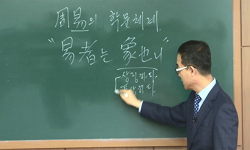The history of thought or intellectual history of a particular period should be approached and viewed in social and historical contexts. During the mid-Joseon period, the main paradigm of the intellectual world was the idea that one ought to cultivate...
http://chineseinput.net/에서 pinyin(병음)방식으로 중국어를 변환할 수 있습니다.
변환된 중국어를 복사하여 사용하시면 됩니다.
- 中文 을 입력하시려면 zhongwen을 입력하시고 space를누르시면됩니다.
- 北京 을 입력하시려면 beijing을 입력하시고 space를 누르시면 됩니다.

서애 류성룡의 『주역』 이해와 활용 - 지화명이(地火明夷) 괘를 중심으로 = Understanding and Utilizing Ryu Seong-ryong’s “Iching” - Centering on the “Jihwamyeongii(地火明夷)”
한글로보기https://www.riss.kr/link?id=A109091958
-
저자
정승안 (동명대학교 선명상치유학과)
- 발행기관
- 학술지명
- 권호사항
-
발행연도
2024
-
작성언어
Korean
-
주제어
류성룡 ; 징비(懲毖) ; 주역 ; 중용(中庸) ; 지화명이(地火明夷) ; Ryu Seong-ryong ; Jingbi(懲毖) ; Iching ; the moderation (中庸) ; Jihwamyeongii(地火明夷)
-
등재정보
KCI등재후보,미등재
-
자료형태
학술저널
-
수록면
5-41(37쪽)
- DOI식별코드
- 제공처
- 소장기관
-
0
상세조회 -
0
다운로드
부가정보
다국어 초록 (Multilingual Abstract)
The sagely goal of moral self-perfection was at the basis of zeitgeist shared by Joseon literati as the sense of predicament.
Their worries about and care toward the people in all-under-heaven were expressed as the sense of predicament in various ways. Ryu Seong-ryong who never deviated from the universal path of Joseon literati expressed his sense of predicament: he developed his idea through close reading of the hundred schools and histories. During the unprecedented crisis of the Imjin War, Ryu Seong-ryong expressed his sense of predicament in his life paths and social practices.
During the crisis of the Imjin War, he never waned in his sense of duty towards the people. He was at the commanding heights of managing critical issues and overcoming challenges from within and without. Even during the war, he dutifully guarded future generations against grave challenges, which is truly praiseworthy from the present perspective. His spirit of Jingbi as well his sense of predicament was rooted in his comprehension of the doctrine of the mean and the Book of Change. For this reason this paper studies Ryu’s uses of the Book of Change as the leading intellectuals and statesmen used this classic at times of crisis. The interpretations of the four hexagrams from the Book of Change in the Byeongsan Academy, although not verified to be of his own writing, epitomize his sense of predicament and spirit of Jingbi. This paper will inquire into Ryu’s view of the Book of Change in terms of how his thought influenced later generations.
The history of thought or intellectual history of a particular period should be approached and viewed in social and historical contexts. During the mid-Joseon period, the main paradigm of the intellectual world was the idea that one ought to cultivate his mind to become a sage through the investigation of things and rectification of the mind. The idea of Neo-Confucian self-cultivation required that even the ruler ought to walk alone the sagely path and to read the Great Learning. The rule was even required to sit in at court lectures for continuous self-improvement.
The sagely goal of moral self-perfection was at the basis of zeitgeist shared by Joseon literati as the sense of predicament.
Their worries about and care toward the people in all-under-heaven were expressed as the sense of predicament in various ways. Ryu Seong-ryong who never deviated from the universal path of Joseon literati expressed his sense of predicament: he developed his idea through close reading of the hundred schools and histories. During the unprecedented crisis of the Imjin War, Ryu Seong-ryong expressed his sense of predicament in his life paths and social practices.
During the crisis of the Imjin War, he never waned in his sense of duty towards the people. He was at the commanding heights of managing critical issues and overcoming challenges from within and without. Even during the war, he dutifully guarded future generations against grave challenges, which is truly praiseworthy from the present perspective. His spirit of Jingbi as well his sense of predicament was rooted in his comprehension of the doctrine of the mean and the Book of Change. For this reason this paper studies Ryu’s uses of the Book of Change as the leading intellectuals and statesmen used this classic at times of crisis. The interpretations of the four hexagrams from the Book of Change in the Byeongsan Academy, although not verified to be of his own writing, epitomize his sense of predicament and spirit of Jingbi. This paper will inquire into Ryu’s view of the Book of Change in terms of how his thought influenced later generations.
동일학술지(권/호) 다른 논문
-
류성룡의 전인적 리더십 연구 - 에니어그램 성격진단을 중심으로 (2)
- 서애학회
- 서재진
- 2024
- KCI등재후보,미등재
-
- 서애학회
- 관월
- 2024
- KCI등재후보,미등재
-
류성룡 ‘문충’ 증시(贈諡)에 대한 김장생의 반대와 그 배경
- 서애학회
- 류을하
- 2024
- KCI등재후보,미등재
-
- 서애학회
- 김성실
- 2024
- KCI등재후보,미등재




 KCI
KCI KISS
KISS







